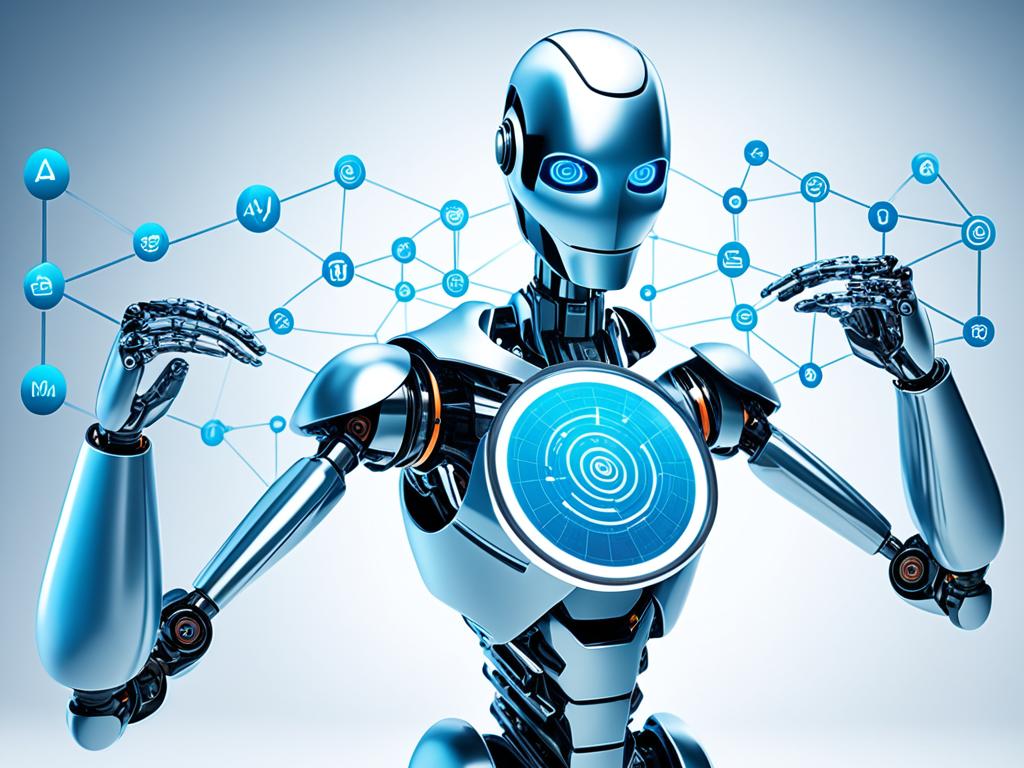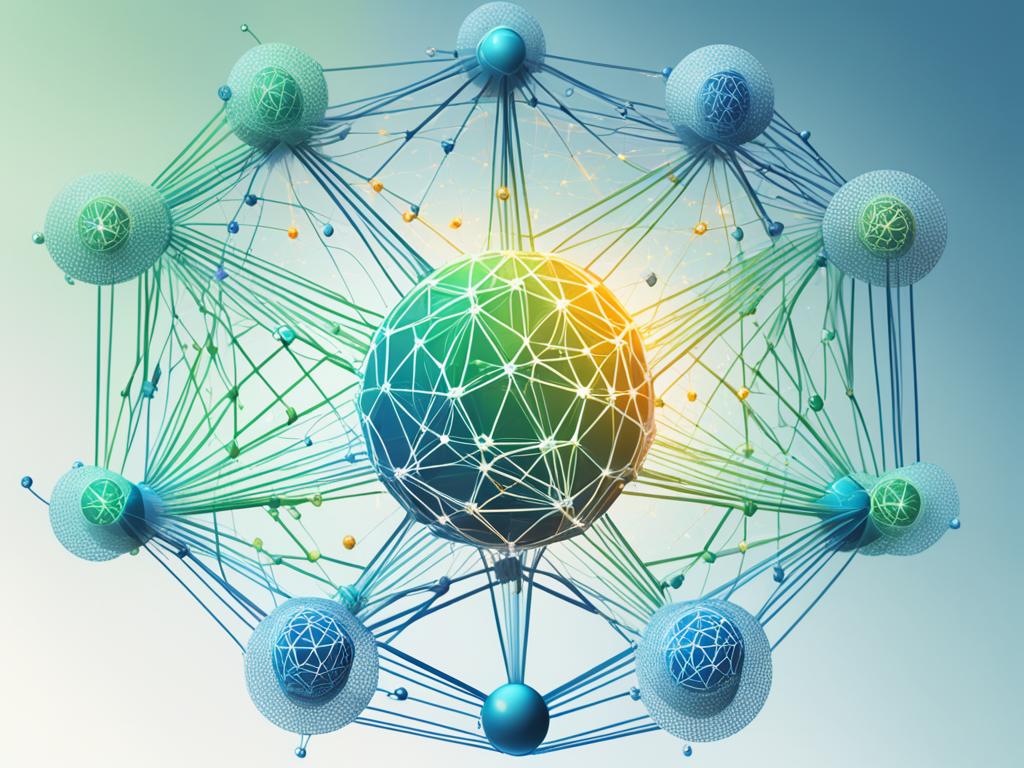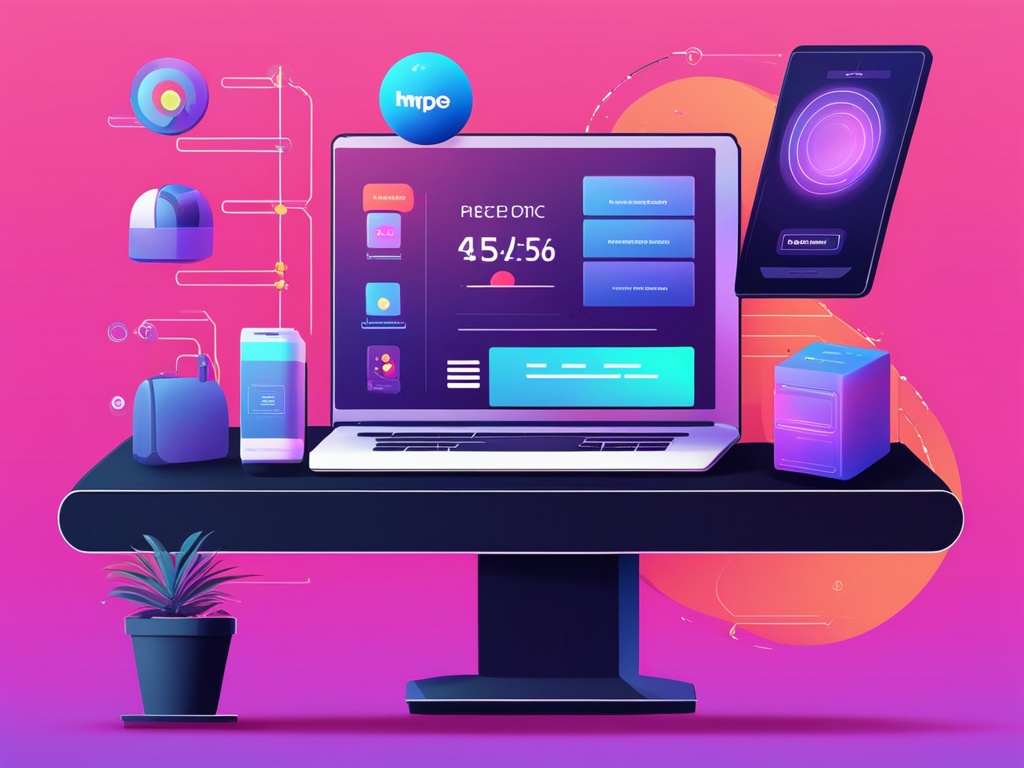Can technology really get to know us well enough to customize each marketing message? With AI marketing’s rise, we see a bright future for personalizing marketing. AI and affiliate marketing are coming together to begin a new era. Here, personalisation is key, changing how brands and consumers interact. This tech helps marketers create custom experiences that hit the mark, leading to more engagement, better conversions, and stronger campaign results.
Brands now use AI to sift through loads of consumer data and craft custom interactions. This change is redefining affiliate marketing strategies. It also raises the bar for consumer happiness and business achievements. Keep reading to learn how AI marketing is changing personalisation. You’ll also discover the latest trends in affiliate marketing that are worth your attention.
Key Takeaways
- AI marketing technology is transforming personalisation in marketing for more effective affiliate campaigns.
- Brands are leveraging AI to deliver tailored experiences to individual consumers.
- Personalisation driven by AI leads to higher user engagement and conversion rates.
- Understanding consumer data is crucial for successful AI-driven personalisation.
- AI enhances overall campaign performance by providing deep insights and predictive capabilities.
Introduction to AI in Affiliate Marketing
Today’s digital world is always changing. It’s very important to know how artificial intelligence (AI) is used in affiliate marketing. Let’s explore how AI is changing marketing strategies for the better and making customers happy.
What is AI in Marketing?
In marketing, Artificial Intelligence means using tools that make decisions like humans do, but automatically. These tools include AI personalization, figuring out what will happen next, and grouping customers. They make marketing better. With AI, marketers can work smarter, predict trends, and run more successful campaigns.
The Rise of Personalised Experiences
AI personalization is changing the game. It lets brands create content just for you based on your data. AI looks at lots of data to understand what each customer likes and does. This makes every interaction feel special.
Because of this, customers enjoy a better experience, which makes marketing more powerful and fun. AI can handle lots of information. This lets marketers create affiliate campaigns that really connect with people. This boosts user involvement and increases sales.
How AI Enhances Personalisation
Artificial Intelligence (AI) is changing how we personalize marketing. It uses customer data and learning models. This means brands can create special experiences for each person. AI is making personalization in marketing better and more specific.
Understanding Customer Data Platforms
Customer data platforms (CDPs) are key for better personalization. They collect info from different places like websites and social media. CDPs put all this information together. This gives brands a clear picture of who their customers are.
| CDP Feature | Description | Benefits |
|---|---|---|
| Data Integration | Combines data from multiple sources | Creates a single customer view |
| Customer Segmentation | Organizes customers into specific groups | Enables targeted marketing campaigns |
| Real-Time Data Processing | Updates customer profiles instantly | Allows for immediate personalisation |
The Role of Machine Learning Models
Machine learning is important for analyzing data from CDPs. It looks for patterns and predicts what customers will do next. This helps marketers make better personalization strategies that really match what customers want and need.
Using machine learning, businesses can:
- Enhance predictive analytics to forecast customer actions
- Refine customer segmentation for more accurate targeting
- Automate personalized content delivery in real-time
With customer data platforms and machine learning in marketing, brands can make their personalisation strategies better than ever. This ensures a unique and engaging experience for every customer.
AI-Powered Affiliate Targeting Strategies
Embracing AI-driven methods changes affiliate marketing, making every interaction count. Advanced AI tools help us meet users‘ changing needs promptly.

Dynamic Content Delivery Methods
Dynamic content delivery is key in AI-powered affiliate marketing. It lets brands modify content based on real-time data to better match what audiences are currently engaged with. This boosts engagement and relevance effectively.
Whether it’s through personalized emails, customized web pages, or targeted social media ads, the goal is always clear. Deliver the message when it matters most.
Effective Use of Predictive Analytics
Predictive analytics are vital for better targeting in affiliate marketing. By understanding past behaviors, AI can forecast what customers might want next. Marketers can then prepare better, making campaigns that truly speak to their audience.
Here’s a simple explanation of how these two technologies improve affiliate marketing:
| Method | Goal | Benefits |
|---|---|---|
| Dynamic Content Delivery | Real-time Adptation |
|
| Predictive Analytics | Anticipate Customer Needs |
|
Leveraging Natural Language Processing in Marketing
Natural language processing (NLP) has changed how we talk to our customers. It helps us understand them better. With NLP, businesses can make their customer interactions more personal and engaging.
NLP for Better Customer Interactions
NLP is great for improving how we interact with customers. Brands can look at customer questions and respond quickly and accurately. This makes customers happier and more loyal to the brand.
NLP lets businesses get the real meaning of customer talks. This helps give responses that better fit what the customer needs.
Sentiment Analysis and Its Benefits
Sentiment analysis is key in NLP for marketing. It helps us understand how customers feel about our products or services. Marketers can use this info to make better plans.
- Improved customer feedback analysis: Sentiment analysis shows where a brand does well and where it can get better.
- Targeted marketing: It aids in making marketing efforts more precise, matching the audience’s emotions and likes.
- Empathetic communication: Knowing customer feelings leads to more caring and effective talks, building stronger bonds.
Using NLP and sentiment analysis makes sure we’re not just talking; we’re connecting. It leads to happier and more loyal customers.
Benefits of AI in Conversion Optimization
Using AI for conversion optimization gives affiliate marketers big advantages. AI personalizes the user experience. This makes each visitor feel special and boosts affiliate marketing performance. AI uses big data to find the best ways to convert visitors. This helps marketers make smarter choices.
AI benefits include doing A/B testing on a big scale. Traditional A/B testing is slow and has limits. But AI can test quickly, using lots of data to improve designs and content. Marketers can easily find what users like. This means they can show the best content to the right people.
Predictive analytics is another key benefit which improves affiliate marketing performance. AI tools predict what users will do by looking at past data. Marketers can then give users what they need when they need it. Using AI means fewer people leave the site and more people engage. This leads to more conversions.
AI doesn’t only help get better conversions. It also creates loyal customers. By giving users content and offers they care about, brands can connect more deeply with them. This strong connection means people are more likely to come back. So, the value of each customer grows over time.
| Traditional Methods | AI-driven Methods |
|---|---|
| Manual A/B Testing | Automated A/B Testing at Scale |
| Limited Data Analysis | Real-time Data Insights |
| Generic Marketing Efforts | Personalized User Experiences |
| Reacting to Trends | Predicting User Behavior |
Adopting AI for conversion optimization brings unmatched precision and efficiency. It lets affiliate marketers get great results. AI not only improves marketing strategies but also makes them ready for the future. It leads to big, lasting AI benefits.
The Role of Recommendation Engines in Affiliate Marketing
In affiliate marketing, recommendation engines are key. They drive sales and make the user experience better. With AI, marketers offer personalized suggestions that fit what each user likes. This makes it easy to choose from lots of products.

How Recommendation Engines Work
Recommendation engines analyze lots of data, like what users browse and buy, plus their ratings. They use smart algorithms to see patterns and guess which products a user will like. This makes shopping smoother and keeps users engaged by offering more relevant choices.
Driving Sales with AI-Powered Recommendations
AI-powered recommendations are now essential for increasing sales. They suggest products that users are likely to buy, helping raise conversion rates. This can be through upselling or cross-selling, ensuring users find what they need. It boosts customer happiness and loyalty.
These engines enhance the shopping trip and give insights into what consumers do. This helps companies improve their marketing tactics. Here’s a look at how recommendation engines change the game compared to old-school marketing:
| Criteria | Traditional Marketing | With Recommendation Engines |
|---|---|---|
| Customer Engagement | Moderate | High |
| Conversion Rates | Average | Above Average |
| User Experience | Generic | Personalized |
| Sales Performance | Standard | Enhanced |
Case Studies: AI Success Stories
Many brands have seen great success with AI in their marketing. They used AI to make their marketing efforts more personal. These success stories show us how AI can change the game in marketing.
Brands that Excel in AI Personalisation
Amazon is known for its advanced recommendation engine. It uses AI to suggest products that customers might like. This leads to more sales and happier customers. Netflix has its own way of using AI. It suggests shows and movies to keep you watching. This keeps viewers happy and coming back for more.
Spotify makes listening personal by creating playlists that match your taste. This makes users more engaged and loyal to the brand. All these examples show how AI can transform marketing.
It’s important to understand how successful AI marketing campaigns are. We look at things like how much people buy, how long they stay customers, and how engaged they are. These metrics show us if AI personalization is working.
| Brand | Key AI Strategy | Success Metrics |
|---|---|---|
| Amazon | Recommendation Engine | Increased Sales, Customer Satisfaction |
| Netflix | Personalized Viewing | Viewer Engagement, Retention |
| Spotify | Custom Playlists | User Engagement, Brand Loyalty |
These stories of AI in marketing show us how smart strategies can make a big difference. They help create experiences that are more personal and meaningful to customers.
Challenges of Implementing AI in Affiliate Marketing
Adding AI to affiliate marketing changes the game, but it’s not all smooth sailing. To make it work, marketers have to tackle several obstacles head-on. Let’s look at the main issues and how we might solve them.
Overcoming Data Privacy Issues
Keeping customer data safe and using it right is a big deal today. We have tough rules like GDPR and CCPA to follow. Marketers need strong data protection to keep trust and follow the law. Using encryption, collecting data without names, and doing regular checks helps with this.
Dealing with Technological Complexities
AI technology is complex and can be hard to add to marketing. Understanding machine learning and data analysis is crucial. By working with tech pros or training the team, marketers can smoothly blend AI with what they already do.
Cost Factors and ROI
AI isn’t cheap, and managing costs is a challenge. Yet, it’s important to look at the long-term gains to justify spending. With smart budgeting, the right AI tools, and tracking how well AI campaigns do, marketers can make the most of their money for better results.
| Challenge | Strategies for Overcoming |
|---|---|
| Data Privacy Issues | Encryption, Anonymous Data Collection, Regular Audits |
| Technological Complexities | Collaboration with Experts, Team Training, Continuous Learning |
| Cost Management | Budget Planning, Scalable AI Tools, Measuring Campaign Efficiency |
Future Trends in AI Personalisation Strategies
The future of AI marketing looks bright and filled with innovation. We are heading towards using more advanced machine learning. This will let marketers create content that is very personalized and accurate, and it’ll be fast.
“The power of AI in creating hyper-personalized marketing experiences is unmatched. As technology evolves, so does our capability to predict and meet customer needs with incredible precision,” says an AI expert.
Privacy and ethics are also getting more attention. As AI shapes personalized marketing, protecting user data is key. We must ensure privacy laws are followed. This is crucial to keep trust and meet legal needs.
Real-time personalization is changing the game too. With faster data handling, instant custom content is becoming normal. Marketers in tune with these trends will shine in affiliate marketing’s dynamic world.
| Future Trends | Impact on Marketing |
|---|---|
| Advanced Machine Learning | Increased accuracy and efficiency in content personalization. |
| Emphasis on Ethics and Privacy | Enhanced consumer trust and compliance with regulations. |
| Real-Time Personalization | Immediate and relevant content, leading to higher engagement. |
Personalisation at the Highest Level: AI in Affiliate Marketing
In the fast-moving digital marketing world, high-level personalisation is now essential. AI helps us create targeted marketing campaigns. These campaigns connect with each customer deeply, boosting loyalty. AI-driven strategies help us know and meet customer needs like never before.
With AI, we can quickly process lots of data. This makes every customer interaction as relevant and effective as possible. Such targeted marketing makes campaigns more personal. The more tailored the approach, the better our chances of keeping customers and making sales.
| AI-Driven Engagement Benefits | Description |
|---|---|
| Personalised Experiences | Using AI to tailor experiences based on user behavior for higher engagement. |
| Increased Conversion Rates | AI’s data analysis drives strategies that lead to better conversions. |
| Real-Time Adjustments | Ability to adapt strategies instantly based on real-time data. |
| Enhanced Customer Insights | Gives deep insights into what customers like and do. |
AI changes the game in affiliate marketing. It opens doors to high-level personalisation that truly engages customers and boosts sales. By using AI, marketers can create experiences that not only draw in customers but keep them too. This is key for long-term success in the tough world of digital marketing.
How to Get Started with AI in Your Affiliate Marketing
Starting with AI in affiliate marketing might look hard, but the right steps can boost your efforts a lot. Let’s go through the beginning steps to make this change smooth and rewarding.
Choosing the Right AI Tools
It’s important to pick the best AI marketing tools for what you need. Look for tools that offer deep data insights, predict trends, and can automate tasks. Think about using platforms like HubSpot, which uses AI to help score leads and suggest content, or Salesforce Einstein for better customer understanding and personalized experiences. Your chosen tool should match your business aims and support your marketing plans.
Integrating AI into Your Marketing Strategy
Once you’ve picked the right AI marketing tools, weave them into your marketing strategy. This means making AI a part of your current processes to boost both efficiency and results. Start by mapping out your goals and how you’ll bring AI into the picture. Begin with something small like automating your email marketing or making web content more personal, and then expand as you get more familiar with the tech.
Always check on how your strategies are doing and tweak as needed. By taking these steps, you’ll ease into using AI for affiliate marketing. This can help you do better and stay ahead in the market.
Conclusion
It’s clear that AI has a big role in modernizing affiliate marketing. Using AI lets marketers create tailored experiences for their customers. They can use customer data and machine learning to better understand and reach their audience.
We’ve looked at how AI changes the game through dynamic content, predictive analytics, and recommendation engines. Through AI, sales can increase, and customer interactions can improve. Natural language processing and sentiment analysis make messages more relevant and personal.
Looking ahead, it’s crucial to follow new trends and tech in AI. Marketers who keep refining their AI strategies will see more success. Using AI in marketing isn’t just a trend. It’s a smart move for competitive edge and long-term growth. Let’s embrace AI to make our marketing more personal and effective.
